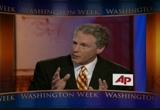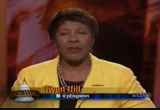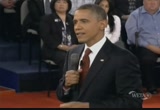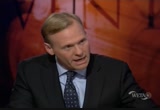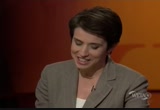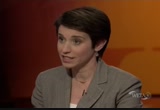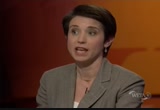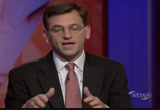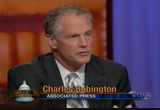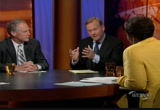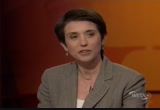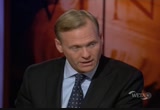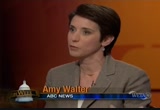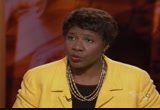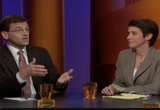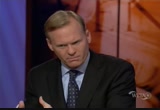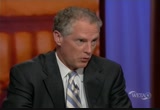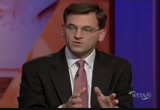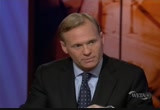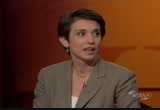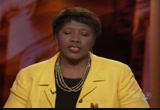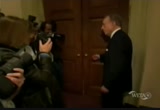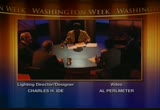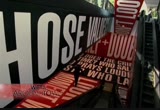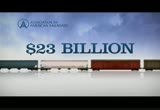tv Washington Week PBS October 20, 2012 6:30pm-7:00pm EDT
6:30 pm
gwen: two presidential debates down. one to go. as the race gets tighter, what have we learned? tonight on "washington week." >> he knows how to seize the moment, this president. and already has a compelling new campaign slogan. you're better off now than you were four weeks ago. >> after my sworn trip in 2008, i was attacked as a celebrity because i was so popular with our allies overseas and i have to say i'm impressed with how well governor romney has avoided that problem. gwen: why did a formal charity dinner do nothing to obscure what's at stake for the two men running for president? >> mr. president, let me finish. i'm going to continue. gwen: back on the post postdebate stump, each stepped up the attack. >> if you say you're for equal pay, for equal work, but you
6:31 pm
keep refusing to say whether or not you'd sign a bill to protect equal pay for equal work, you might have romnesia. >> i think the american people had expected that the president of the united states would be able to describe what he's going to do in the next four years. but he can't. gwen: from benghazi to biners, from contraception to cars. the campaign heads into the final stretch. covering the race to the finish line, charles babington, peter baker, john dickerson and amy walter. >> award winning reporting and analysis. covering history as it happens. live from our nation's capital, this is "washington week" with gwen ifill. produced in association in national journal d. corporate funding for
6:32 pm
"washington week" is provided by -- >> this rock has never stood still. since 1875 we've been there for our clients through good times and bad. when their needs changed we were there to meet them. through the years, from insurance to investment management, from real estate to retirement solutions, we've developed new ideas for the financial challenges ahead. this rock has neverod sto still. and that's one thing that will never change. prudential. >> whenever our trains go, the economy comes to life. onone line, infinite
6:33 pm
possibilities. >> additional corporate fund something provided by boeing. additional funding is provided by the annenberg foundation. the corporation for public broadcasting. and by contributions to your pbs station from viewers like you. thank you. once again, live from washington, moderator gwen ifill. gwen: good evening. what's at stake in this election came into sharp focus this week, both at the contention long island debate and the days that followed. it's now clear that as the polls tighten, both men are fighting for the same voters, not necessarily the undecided ones, but the decided ones, who can be persuaded to show up on election day to cast the ballot for the man they trust the most. that's what these debate night exchanges about energy, taxes and the 47% were really about. >> production on government
6:34 pm
land of oil is down 14%. and production -- >> what you're say something not true. it's just not true. >> it's absolutely true. you have looked at your pension? >> i've got to say -- >> mr. president, have you looked at your pension? >> i don't look at my pension. it's not as big as yours so it doesn't take as long. >> i care about 100% of the american people. i want 100% of the american people to have a bright and prosperous future. >> when he said behind closed doors that 47% of the country considered themselves victims, who refused personal responsibility, think about who he was talking about. folks on social security who have worked all their lives. gwen: even the much-discussed disagreement about whether the administration misled the public about the attack in benghazi was about believability. so what did those exchanges tell you about what each man came to the debate to accomplish? john? >> well, let's start with the president. i think what he came to accomplish was that he was actually awake for this debate. he made a joke at that al smith
6:35 pm
dinner that he was so rested for the second debate because he'd had a nap during the first one. and what democrats wanted to see was the president call out mitt romney on some of these distortions that the president said he's been putting forward. they wanted to see him be an advocate as we just saw in that clip for a philosophy, for a world view. and look like he was fighting for it. that the ideas were important enough to be worth fighting for and that he then indeed was going to fight for them. what did mitt romney come to do? he came to basically show that the first debate was not a fluke. that he has a set of ideas for the future, that he can say to these obama voters from twan 2008, who are disappointed with this president, that he can say to them, i have a clear plan. now, he has -- and he mentioned his five-point plan several times. and what the romney campaign says, is that in their research after these debates people may not be able to remember the five points in the plan. they may not be able to remember the details or lack of same. they just know he has a plan and that's good enough. gwen: so the president was on the precipice before he walked
6:36 pm
into this debate hall and mitt romney was trying to keep the wind at his back. who accomplished what he set out to do? >> we don't really know yet because we have to let it mar nate a little bit. i like -- mar aid in a little bit. i like to talk about it as a crock pot. you have to let it steep in there for a while. you can stir it around. >> you're supposed to let it go. that's why my crockpot recipes are always terrible. >> they both thought the other was a crock. >> he's on fire. >> now i got my crockpot analogy all messed up. anyway. we had a poll that came out, for example, the other day. the gallup poll came out and it got washington and many other folks who follow politics in a tizzy because it showed that mitt romney was up seven points. which was a tremendous advantage, right? we said, gosh, how could that be? seven point, people were trying to figure this out. and it wasn't but an hour later that polls came out or a couple hours late that are polls came
6:37 pm
out in the battle ground states of iowa and wisconsin showing that the president was up eight or nine points. we cannot possibly live in a world where one candidate is up seven points nationally and is behind eight points in the state. but i think what we are seeing is that the romney enthusiasm, that's one thing that helped -- he helped to boost up the enthusiasm for his candidacy from flagging from the flagging base. that's what he did in denver. what did he do the next -- at the next debate? we don't quite know yet but i agree with john that what he was aiming to do, just need to get those conservative voters anymore, he is aiming to get those more moderate swing, the obama 2008 voters, trying to show more moderate mitt. and also saying to those voters, who have only seen a care contour of him -- character tour of him. you have only seen negative things about him. he's this terrible capitalist who is going to take your jobs and ship them overseas.
6:38 pm
he doesn't believe women have a right to contraception. he is a terrible person. when he went onstage in both of those debates, he actually shattered some of those. so i think what i'm waiting to see going back to the crockpot for just one second, what i'm waiting to see is not what the head-to-head numbers look like but what do the numbers underneath look like? so, after two of these debates, what do voters think now about mitt romney? do they think better of him as a person? but more important, what do they think about him in terms of his ability to relate to them? and that question on who do you think would do a better job looking out for the middle class? that is where president obama's had a big, big lead throughout the campaign. we'll see if it's held up. and who do you believe will do a better job on the economy? that's where the president has been tied with mitt romney. gwen: let's break this down a little bit. just piece by piece. on the libya, benghazi dispute, peter, we saw them fighting about nuance, about active terror, whether the president
6:39 pm
says it was an act of terror, or terrorism. yet there was another argument to be made about whether the u.s. had done all it could to protect the citizens on the ground there. that's not the argument we saw. >> it wasn't. you're right. the voter who asked the question, and this was a town hall-style debate, asked why -- who made the decision not to provide more security when it was requested and why and the president didn't answer. he did say, i take ultimate responsibility. what happened there was my responsibility. but he didn't really answer that question. instead it became as you say a semantic debate. a terrorist act. it kind of got lost i think. governor romney's larger point is that the administration didn't really own up to what really happened in benghazi until a number of days and weeks had passed and attributed it too much to this idea of a pro test which now seems not to have happened over this antiislam video. and president obama was able to sort of like derail that critique by focusing on the small aspect which candy tried
6:40 pm
to correct on both sides. he said the president did say it was an act of terror and he pointed out that governor romney had a larger point which was accurate. >> and having hillary clinton come out before the debate and say, if it was a problem, it was my problem. that also defused that line of argument. gwen: right after that we have seen very little reference back to this doubling down of denial as mitt romney was calling it a week ago when it comes to libya. >> gwen, we've known all along that this election's mostly about the economy. people do care about our role overseas and that sort of thing. what happened in benghazi is complicated, it was horrible, of course, but very complicated. the steps that led up to it are still partly unknown. but peter made a good point that the question was not -- the president did not answer the question and mitt romney seemed to have an opportunity there that i think he missed. he did not point out that the president did not answer the question. he seemed to sort of walk into this whole tactical thing about what was said and not said and
6:41 pm
he blundered there. i'd be very surprised. the monday night debate, the last one, is on foreign policy. i'll bet you he will have a much more polished and precise critique of what happened in benghazi. >> we've talked about the fact that the president didn't answer the questioner. they both didn't answer plenty of questions. gwen: plenty of questions. >> before the debate, bill clinton was asked about what the two men should do and he said, you should be respectful of the questioner, you should make sure you answer their question and this was all about connecting with the voters and because they are the proxy for the electorate. so connect with them and because both men are trying to find a way to do this, often the voters were props. and then if you were a swing voter watching this and this weird chest thumping that was going on between the two men. there was a point in which i thought candy was going to say, boys, take it outside. it looked like they were roosters in a ring. >> they were stalking each other. >> if you were an undecided voter watching and listening to them talking over each other and bickering about nuance and not have anything to do with the question at hand or the questions people care about, i would imagine you were turned
6:42 pm
off. that will be another thing -- gwen: and if you were an undecided woman voter which is the vote they're both going after. they're not really thrilled in watching boys punch it out in a ring quite that way. the question that was asked about pay equity didn't get answered either. >> right. it was supposed to be about that question and it turned into so many other things and of course the biggest thing it turned into, of course, is the now infamous binder full of women. but at the end of the day, you know, i think you're coming back to that very -- the very point that job made which is, these -- john made which is these two guys were spending a lot of time bashing each other and not a whole lot of time taking those arguments and relating them to the average person and that's what, for all the voters that we all meet, what i hear overwhelmingly from -- especially from women is, i want these men to live just a day in my life. i want them to understand what it's like to be me and to have to try to do the 10 or 15 things i'm doing in a day.
6:43 pm
and this is why this issue about who understands the middle class, who understands those values is going to be very important. and for mitt romney, to be able to shat that are image. gwen: one thing they do get is that they need those voters. if you have any doubt that both campaigns are doubting them, take a look at these new ads that went up in battle ground states instantly the debate ended. both of them about abortion rights. >> banning all abortions. >> i'd be delighted to sign that bill. >> trying to mislead us. that's wrong. but then all abortions? only if you vote for him. >> you know, those ads say mitt romney would ban all abortions and contraceptions seemed a bit extreme. so i looked into it. turns out romney doesn't oppose contraception at all. gwen: it's not an accident that they're duking it out over this but what i'm curious about is whether it's really about abortion this argument, or whether it's really about getting women to pay attention
6:44 pm
and show up. >> both. i think for the -- certainly for the obama voters it's about, hey, there are real things at stake here. this is don't be blase' if you're a woman and you kind of liked president obama but you've grown disillusioned and you might not show up. you have to show up because the issues you care about are at play. gwen: obama has lost ground with women voters, right? >> he has. we don't know. some polls suggest he's lost quite a lot of ground. he won -- he beat john mccain among women by 13 points. he needs to do that well or better. he's not doing that well even if you look consistently at polls. the question here is, a, turnout. but also that word extreme. senator bennett won his senate race in colorado in 2010 by essentially taking his republican opponent and telling suburban women, this guy is off the charts extreme. and that worked, it also worked in nevada for harry reid when he ran. that's what's at play here with suburban women in virginia. it's so targeted now. we almost know her name and she lives in a suburb of washington
6:45 pm
and virginia and this is the idea. it's that it's the issues that you care about but it's also extreme. >> the difference in those races is those were senate races with unknown candidates. nobody knew who these candidates, these republican candidates were. and it was this talk about the tea party. it is quite remarkable that we are back to this place now where we talk about the fact that mitt romney allowed himself to be defined like he was simply a senate candidate. rather than a candidate running for president. he was defined not just by these ads back here but long before that. they've been running those abortion ads in northern virginia, in the suburbs of denver for quite some time. gwen: i was kind of surprised to see mitt romney bring up that he was representing the 100%, giving the president an opening to talk about the 47%. >> we went through 90 minutes and in fact the president didn't bring up the 47%. we were told that in fact the president wasn't planning to in the first debate bring up the 47% at all. gwen: but he was going to do it
6:46 pm
in the second debate. >> they were going to let romney respond to it and they'd rather have the issue. so how did he do it in the second debate? he waited until the closing argument. governor romney went first and tried to preeveryonetively address. it so then president obama gets the last word and he goes after him on the 47% in a way that romney can't respond to. gwen: is there an enthusiasm factor here which is going to drive voters to the polls or is there a lack of enthusiasm factor that people are worried about? >> you hear both campaigns talk about this issue all the time. republicans are really happy, they feel that that first debate where romney did so much better drove up his enthusiasm by a large amount and with lasting power. they are as happy about that as almost anything. you see in these polls, repeatedly that romney does much better among likely voters as opposed to registered voters and the pollsters try to ask a series of questions to figure out, are you really going to vote or maybe going to vote?
6:47 pm
and what they're seeing is stronger enthusiasm for romney and that's why he does better among likely voters. republicans feel that part of that comes out that have debate. >> the impact of the poll, you talked about the gallup poll which some people criticize for showing a seven-point lead but the important thing is it helps republican campaigns, it shows republicans he can win. all these republicans who have doubted, he hasn't won a great campaign, president al -- suddenly looking at this campaign saying, hey, this could work. maybe we need to go out and do more. >> you see that at romney's rallies where he shows up and they explode in a way that usually hasn't been associated -- gwen: i heard in north carolina there were record lines to early vote this time, even more so than last time. >> the other side of that coin is there's opportunity for obama, if these polls are right, and he has more soft support, where people say, i'm for obama, i'm not sure i'm going to vote. this early voting which is taking place in almost all of the battle ground states gives his ground operation, which by
6:48 pm
all accounts is pretty strong day after day after day, to target these people, find them, take -- drive them to the polls if they have to. so that is the opportunity that obama has. >> and we saw a little bit of them playing to they'll vote today, when the president was talking about romnesia. very proud of himself for that. that was constant patting of himself on the back for that phrase. but why the jokey phrase? it's funny, it appeals to junker -- younger voters. it gets some buzz and those younger voters are the ones they want. early voting starts in north carolina tomorrow. they want them and it's already started in plenty of other places. they want them getting to the polls. this is something that kind of is fresh and flashy. it gets to be a build-up of the momentum. >> and what a difference four years makes. in 2008 he was getting them to the polls by, this was a vote for barack obama, this is historic, this is so powerful. now it is by calling your opponent an extremist and basically making it a referendum on mitt romney and how terrible he's going to be.
6:49 pm
it's a fear factor in turning out the vote instead of an optimism. gwen: is this a base election where everyone's trying to drive out as many people as possible who support them and make the other people discouraged? or is it a vote as we keep hearing for the undecided voter? that narrow slice in the niddle -- middle? >> for the people i've talked with in both campaigns, it's not strongly one or the other and we have seen past elections which were one more -- which were more one than the other. each base is to get voters to the polls. obama need to do that. there's still some weavering voters. there's not that many but this thing is so close that it doesn't matter. republicans feel very strongly that there's still a number of voters who kind of want to fire barack obama. they're disappointed in him but they haven't quite decided that romney is ok and this is going to what aimy was talking about. they've seen all these ads about what a bad guy he is
6:50 pm
that's why republicans feel it was important for romney to do so well at that first debate. gwen: does a foreign policy debate, which is what we see looming on monday night, speak to any of those voters? >> i think it does. obviously foreign policy is like, you know, 150th on the list of priorities in this year's election according to polls. i'm making that number un. -- up. gwen: just for the record. >> but i think what it will come down to, a little bit on monday, is about issues of leadership, trust, character, who do you relate to? the difference is, if you actually narrow down the policy differences between the two, they're relatively miner. as we really at stake in this conversation is -- what's really at stake in this conversation is who do you think leads america better? romney says president obama has been weak. president obama said osama bin laden, got him. that's the essence of his argument. it may be a bigger debate than we think it is, despite the lack of attention to these issues. >> i think that's right.
6:51 pm
i think it sends signals. voters sometimes get angry when we don't talk about the specific details and they get angry when the candidates don't do that either but a lot of voters take their views to these candidates back to trust. who am i going to trust when decisions are being made when i'm not at the table? that has to do with their lives and the economy. but they'll get cues from that for this debate. also in carving up the difficult carving that's going to take place in budgets and with the federal government. gwen: we have a little map that we can throw up and take a look at some of the states ich everybody is watching. i'm curious what states you guys are watching. i'm watching wisconsin. how but? >> i'm watching -- everybody's watching ohio. i'll throw in one really scary thought, gwen. if barack obama of the contested states wins -- i'm going to do it, i'm going to do it. if he wins ohio, wisconsin and new hampshire and mitt romney wins the others, not a totally unplausible scenario. you have a 269-269 electoral tie and it goes to the house of
6:52 pm
representatives and, folks, this can happen. >> the president goes to the house of representatives, the vice president goes to the senate. so you couldn't -- could in theory have a president romney and a vice president biden. gwen: i've heard this before. it's never happened. >> then we're going to have a kung fu fight and a marching band. >> what could be more -- which is more likely? the 269-269 or a popular vote winner and an electoral vote winner? >> we've been there before. >> we have been there and that's what these polls are suggesting right now. >> in the opposite direction of what's happening in 2000 which means mitt romney wins the popular and obama wins the -- gwen: and then remind us, those of us who were not traumatized by 2000, what happens then? >> defends -- depend fs there's a supreme court involvement. remember, voters don't decide who the president is. the electoral college decides who the president is an electoral college win equals a win for whoever that person is. that person will be the president. this goes to a bigger question about just how we're getting
6:53 pm
this data. and what we should believe and what we shouldn't. there are more polls than ever. and fewer people answering polls than ever. so that is this conundrum that we're in, that you have all of this data and it may all be -- maybe not completely wrong but off. and if you are off in this case two or three or four points you miss the whole election. >> margins of error. people keep forgetting. gwen: even if you do that, you know it's a dead heat and that makes people very nervous. >> it's a dead heat. nationally and in the battle ground states. so it's interesting, talking to strategists of the campaigns, particularly the romney campaign which has to pick among all these states. you've got to believe these numbers because you got to send the candidates somewhere. so you're reading the numbers and they're so close and it's not science, it's art. so what do you do? do you keep him in florida? do you send him out to nevada? nevada's the state i'm watching because some people think that's gone. it's gone to the democrats. and so --
6:54 pm
gwen: why do you send paul ryan to pittsburgh tomorrow, for instance? >> that could be a head fake. pittsburgh because pennsylvania seems to be in the democratic can. a republican hasn't won it since 1988. maybe it's a head fake. gwen: we're going to see a couple of head fakes in north carolina, too. i can't wait. thank you all. i'm nervous. i don't know about you. because i hate when things are this uncertain. but thank you all very much for this. before we go tonight, we do want to take note of a significant passing, speaking of pennsylvania. arlen specter served as u.s. senator from pennsylvania for 30 years. in his time heading the judiciary committee, he opposed the supreme court nomination of robert bourk but he supported clarence thomas. he was a tough nut, he did a lot of different things in his life and in the end he switched parties. at the end of his career. senator spector was 82 years old. our condolence goes out to his family. thank you to everyone at the table. the conversation has to end here but it continues online. in our "washington week" web
6:55 pm
cast extra. you can also find out werything else our panelists e whe explain why big bird and binders e innot gog to decide ts ection. i know, so disappointing. that's at pbs.org/washingtonweek. monday night, watch the debate with us as judy woodruff and i anchor special pbs coverage and then we'll try to make sense of it all again next week on "washington week." good night. >> funding for "washington week" is provided by -- >> we know why we're here. to connect our forces to what they need when they need it.
6:56 pm
>> to help troops see danger before it sees them. >> to answer the call of the brave and bring them safely home. >> around the globe the people of boeing are working together to support and protect all whoc serve. >> that's why we're here. >> corporate funding is also provided by prudential financial. norfolk southern. additional funding is provided by the annenberg foundation, the corporation for public broadcasting and by contributions to your pbs station from viewers like you. thank you.
277 Views
IN COLLECTIONS
WETA (PBS) Television Archive
Television Archive  Television Archive News Search Service
Television Archive News Search Service 
Uploaded by TV Archive on

 Live Music Archive
Live Music Archive Librivox Free Audio
Librivox Free Audio Metropolitan Museum
Metropolitan Museum Cleveland Museum of Art
Cleveland Museum of Art Internet Arcade
Internet Arcade Console Living Room
Console Living Room Books to Borrow
Books to Borrow Open Library
Open Library TV News
TV News Understanding 9/11
Understanding 9/11
